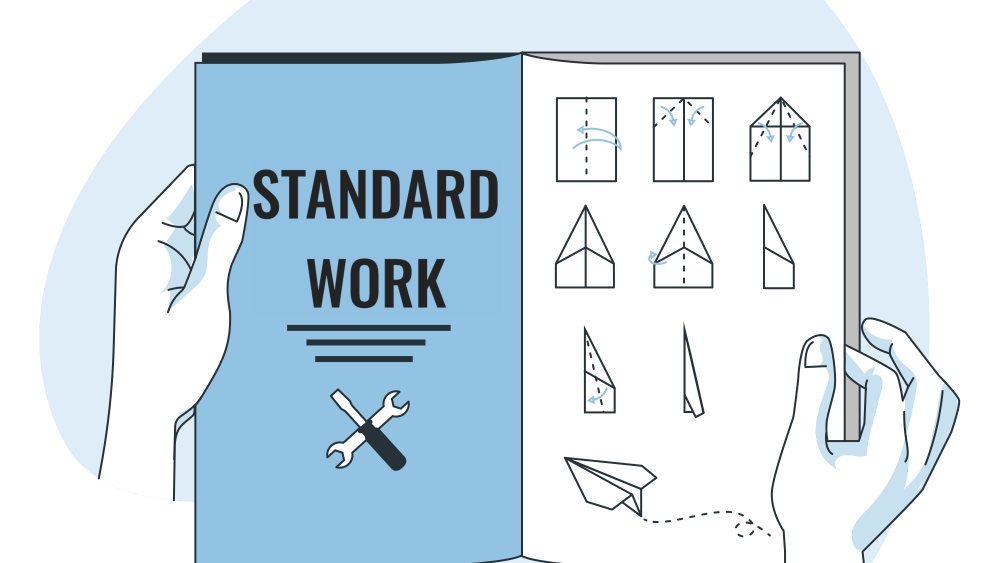In today’s fast-paced business environment, efficiency and consistency are key factors for success. The concept of standard work plays a vital role in achieving these goals. Standard work can be defined as a comprehensive documentation of the most efficient method currently known for producing a specific product or delivering a particular service. It details the steps involved in a process, providing a consistent and repeatable framework.
Implementing standard work brings numerous benefits to the workplace. Firstly, it improves efficiency by eliminating unnecessary steps and reducing variation in work processes. This streamlined approach not only saves time but also reduces costs and improves productivity.
Secondly, standard work enhances consistency in the workplace. By documenting and following standardised procedures, organisations can ensure that work is performed uniformly across different shifts, teams, and locations. This consistency leads to higher quality outputs, fewer errors, and improved customer satisfaction.
To effectively implement standard work, organisations need to consider several key elements. The Job Detail Sheet is a crucial component that provides a detailed breakdown of each task or operation. It includes information such as the required tools and equipment, the sequence of steps, and any safety precautions. This document serves as a reference guide for employees, ensuring that they have all the necessary information to perform their tasks correctly.
Another essential element of standard work is the Standardised Work Chart. It shows operator movement and material location in relation to the machine and overall process layout.
The Standardised Work Combination Table is another crucial component of standard work. It shows the combination of manual work time, walk time, and machine processing time for each operator in a production sequence.
Here are some key steps to consider to implement standard work practices in your organisation:
- Assess Current Processes:Analyse workflows, identify bottlenecks, and gather input from employees.
- Develop Standard Operating Procedures:Develop clear and concise Standard Operating Procedures (SOPs) for each process. Involve employees in the development process to ensure buy-in and ownership.
- Provide Training and Support:Train employees on the new procedures and provide ongoing support.
- Monitor and Measure Performance:Implement performance metrics to monitor the effectiveness of standard work practices. Regularly review and analyse the data to identify areas for improvement.
- Continuously Improve:Encourage employees to provide feedback and suggestions for process improvement.
By documenting and sharing best practices, organisations can promote knowledge sharing and continuous learning. Standard work provides a platform for employees to contribute their insights and suggestions for process improvement. Moreover, it facilitates the transfer of knowledge from experienced employees to new hires, ensuring that valuable expertise is not lost. By embracing standard work, organisations can create a culture of continuous learning and improvement.
Standard work practices ensure that knowledge is captured, documented, and shared within the organisation. By documenting best practices and procedures, organisations can create a knowledge library that can be accessed by all employees. This knowledge library serves as a valuable resource for training, problem-solving, and decision-making. Standard work also promotes knowledge sharing through regular communication and collaboration among employees. By leveraging knowledge management techniques, organisations can harness the power of standard work and maximise efficiency and consistency.
Standard work is the cornerstone for Kaizen because it provides a baseline for evaluation. Any improvement can only be considered an “improvement” if there is a standard to compare it against. This is why Taiichi Ohno, the father of the Toyota Production System, famously stated, “Without standards, there can be no Kaizen.”
Standard work, when viewed as a recipe for success, does not restrict creativity but rather perpetuates success and provides a base for further improvement. Its primary purpose is to lay a solid foundation for problem-solving and continuous improvement.
Embrace the power of standard work in your organisation and experience the benefits of increased efficiency, consistency, and quality. Start by assessing your current processes and develop clear Standard Operating Procedures (SOPs) to establish a foundation for improvement. Involve your employees, foster a culture of continuous learning, and make standard work a cornerstone of your organisation’s success.
Photo attribute:<a href=”https://storyset.com/people”>People illustrations by Storyset</a>


